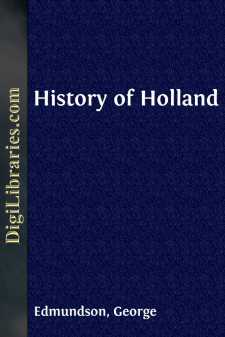Categories
- Antiques & Collectibles 13
- Architecture 36
- Art 48
- Bibles 22
- Biography & Autobiography 813
- Body, Mind & Spirit 142
- Business & Economics 28
- Children's Books 15
- Children's Fiction 12
- Computers 4
- Cooking 94
- Crafts & Hobbies 4
- Drama 346
- Education 46
- Family & Relationships 57
- Fiction 11828
- Games 19
- Gardening 17
- Health & Fitness 34
- History 1377
- House & Home 1
- Humor 147
- Juvenile Fiction 1873
- Juvenile Nonfiction 202
- Language Arts & Disciplines 88
- Law 16
- Literary Collections 686
- Literary Criticism 179
- Mathematics 13
- Medical 41
- Music 40
- Nature 179
- Non-Classifiable 1768
- Performing Arts 7
- Periodicals 1453
- Philosophy 64
- Photography 2
- Poetry 896
- Political Science 203
- Psychology 42
- Reference 154
- Religion 513
- Science 126
- Self-Help 84
- Social Science 81
- Sports & Recreation 34
- Study Aids 3
- Technology & Engineering 59
- Transportation 23
- Travel 463
- True Crime 29
History of Holland
by: George Edmundson
Description:
Excerpt
CHAPTER I
[pg.1]
THE BURGUNDIAN NETHERLANDS
The last duke of the ancient Capetian house of Burgundy dying in 1361 without heirs male, the duchy fell into the possession of the French crown, and was by King John II bestowed upon his youngest son, Philip the Hardy, Duke of Touraine, as a reward, it is said, for the valour he displayed in the battle of Poictiers. The county of Burgundy, generally known as Franche-Comté, was not included in this donation, for it was an imperial fief; and it fell by inheritance in the female line to Margaret, dowager Countess of Flanders, widow of Count Louis II, who was killed at Crécy. The duchy and the county were soon, however, to be re-united, for Philip married Margaret, daughter and heiress of Louis de Male, Count of Flanders, and granddaughter of the above-named Margaret. In right of his wife he became, on the death of Louis de Male in 1384, the ruler of Flanders, Mechlin, Artois, Nevers and Franche-Comté. Thus the foundation was laid of a great territorial domain between France and Germany, and Philip the Hardy seems from the first to have been possessed by the ambitious design of working for the restoration of a powerful middle kingdom, which should embrace the territories assigned to Lothaire in the tripartite division of the Carolingian empire by the treaty of Verdun (843). For this he worked ceaselessly during his long reign of forty years, and with singular ability and courage. Before his death he had by the splendour of his court, his wealth and his successes in arms and diplomacy, come to be recognised as a sovereign of great weight and influence, in all but name a king. The Burgundian policy and tradition, which he established, found in his successors John the Fearless (murdered in 1419) and John's son, Philip the Good, men of like character and filled with the same ambitions as himself. The double marriage of John with Margaret, the sister of William VI of Holland, and of William VI with Margaret of Burgundy, largely helped forward their projects of aggrandisement. Philip the Good was, however, a much abler ruler than his father, a far-seeing[pg.2] statesman, who pursued his plans with a patient and unscrupulous pertinacity, of which a conspicuous example is to be found in his long protracted struggle with his cousin Jacoba, the only child and heiress of William of Holland, whose misfortunes and courage have made her one of the most romantic figures of history. By a mixture of force and intrigue Philip, in 1433, at last compelled Jacoba to abdicate, and he became Count of Holland, Zeeland and Hainault. Nor was this by any means the end of his acquisitions. Joanna, Duchess of Brabant (1355-1404) in her own right, was aunt on the mother's side to Margaret of Flanders, wife of Philip the Hardy. Dying without heirs, she bequeathed Brabant, Limburg and Antwerp to her great-nephew, Anthony of Burgundy, younger brother of John the Fearless. Anthony was killed at Agincourt and was succeeded first by his son John IV, the husband of Jacoba of Holland, and on his death without an heir in 1427, by his second son, Philip of St Pol, who also died childless in 1430....


